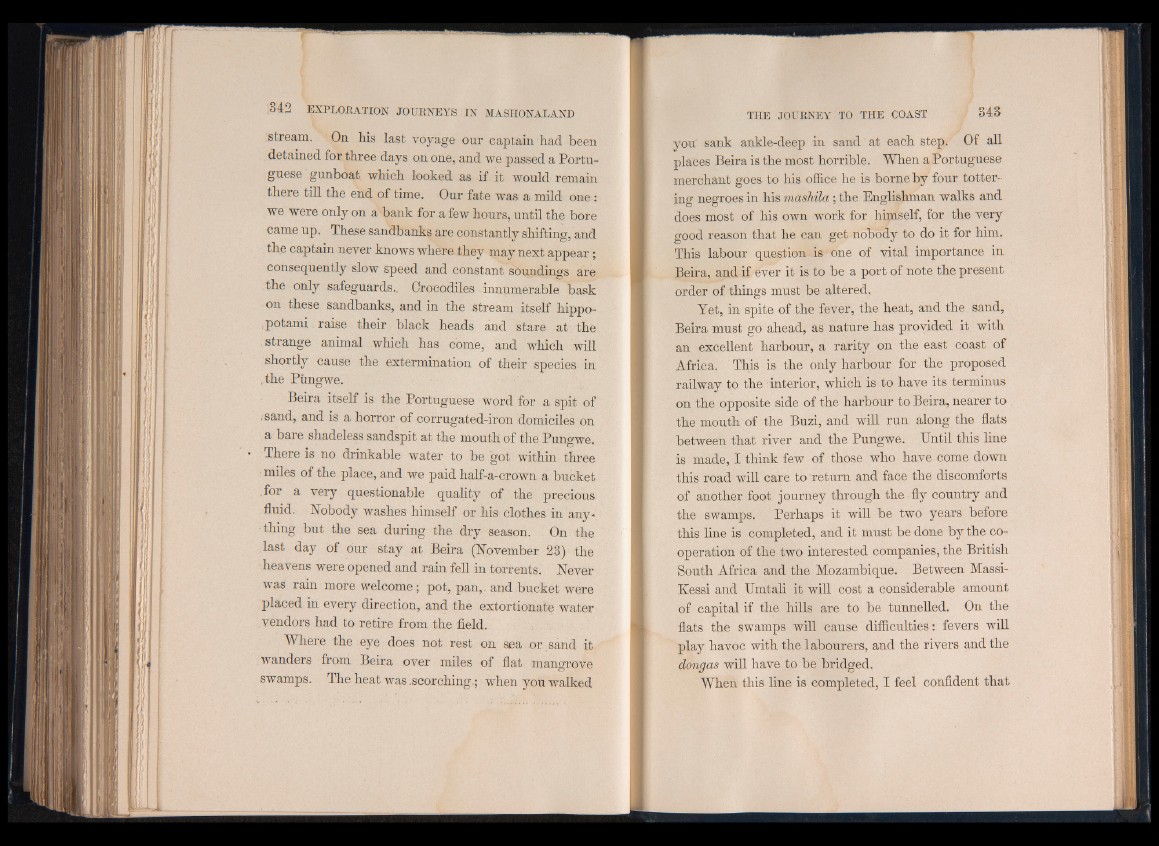
stream. On. his last voyage our captain had been
detained for three days on one, and we passed a Portuguese
gunboat which looked as if it would remain
there till the end of time. Our fate was a mild one:
we were only on a bank for a few hours, until the bore
came up. These sandbanks are constantly shifting, and
the captain never knows where they may next appear ;
consequently slow speed and constant soundings are
the only safeguards.. Crocodiles innumerable bask
on these sandbanks, and in the stream itself hippopotami
raise their black heads and stare at the
strange animal which has come, and which will
shortly cause the extermination of their species in
. the Pungwe.
Beira itself is the Portuguese word for a spit of
.sand, and is a horror of corrugated-iron domiciles on
a bare shadeless sandspit at the mouth of the Pungwe.
There is no drinkable water to be got within three
miles of the place, and we paid half-a-crown a bucket
.for a very questionable quality of the precious
fluid. Nobody washes himself or his clothes in anything
but the sea during the dry season. On the
last day of our stay at Beira (November 23) the
heavens were opened and rain fell in torrents. Never
was rain more welcome; pot, pan,, and bucket were
placed in every direction, and the extortionate water
vendors had to retire from the field.
Where the eye does not rest on sea . or sand it
wanders from Beira over miles of flat mangrove
swamps. The heat was .scorching.; i when you walked
you sank ankle-deep in sand at each step. Of all
places Beira is the most horrible. When a Portuguese
merchant goes, to his office he is borne by four tottering
negroes in his mashila ; the Englishman walks and
does most of his own work for himself, for the very
good reason that he can get nobody to do it for him.
This labour question is one of vital importance in
Beira, and if ever it is to be a port of note the present
order of things must be altered.
Yet, in spite of the fever, the heat, and the sand,
Beira must go ahead, as nature has provided it with
an excellent harbour, a rarity on the east coast of
Africa. This is the only harbour for the proposed
railway to the interior, which is to have its terminus
on the opposite side of the harbour to Beira, nearer to
the mouth of the Buzi, and will run along the flats
between that river and the Pungwe. Until this line
is made, I think few of those who have come down
this road will care to return and face the discomforts
of another foot journey through the fly country and
the swamps. Perhaps it will be two years before
this line is completed, and it must be done by the cooperation
of the two interested companies, the British
South Africa and the Mozambique. Between Massi-
Kessi and Umtali it will cost a considerable amount
of capital if the hills are to be tunnelled. On the
flats the swamps will cause difficulties: fevers will
play havoc with the labourers, and the rivers and the
dongas will have to be bridged.
When this line is completed, I feel confident that